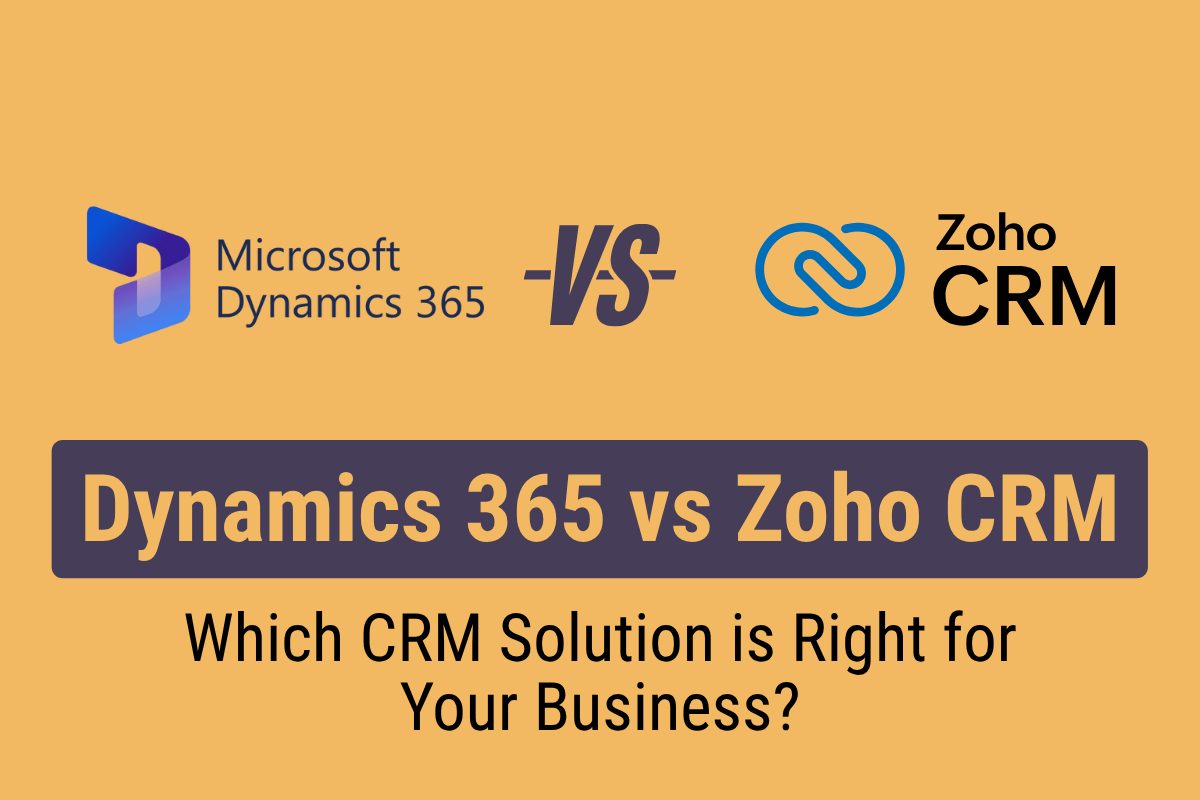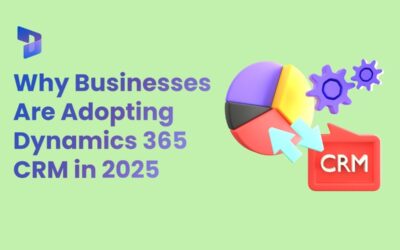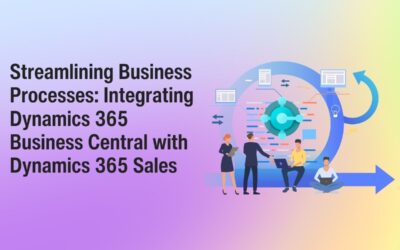Choosing the right Customer Relationship Management (CRM) system is a big decision.
It’s about making sure your business has a single, clear view of customers and prospects. A solid CRM helps you sharpen your sales strategy and stay ahead.
But with so many options out there, how do you pick the right one? Which system will truly support your growth and meet your needs?
In this post, I’ll break down two popular choices: Zoho CRM and Dynamics 365.
We’ll look at key areas like features, pricing, and integration. By the end, you’ll have a clearer picture of which suits your business best.
If you’re interested, I’ve also compared Dynamics 365 with HubSpot and Salesforcein other posts.
Let’s dive in and explore what each platform brings to the table.
Ready to find a CRM that fits your business like a glove? Let’s get started.
Introduction to CRM Solutions
Customer Relationship Management (CRM) solutions have become the backbone of modern business operations.
They help organizations manage and analyze every interaction with customers, leading to better customer experiences and driving business growth.
With the right CRM solution, businesses can streamline sales automation, marketing automation, and customer management across various business functions.
Microsoft Dynamics 365 and Zoho CRM are two leading platforms in this space. Microsoft Dynamics 365 stands out as a comprehensive CRM solution, integrating sales, marketing, and customer service into a single, unified platform.
This deep integration helps businesses manage their entire customer journey and business functions more efficiently.
On the other hand, Zoho CRM is a cloud-based platform designed for simplicity and flexibility, offering essential tools for sales, marketing, and support.
Both solutions aim to enhance customer relationship management, automate key processes, and provide features that support business growth.
Whether you’re looking to improve your sales process, boost marketing efforts, or deliver better customer support, choosing the right CRM platform can make a significant difference in your business outcomes.
What is Zoho CRM?
Zoho CRM is a cloud-based system built to help businesses handle sales, marketing, and customer support.
It’s known for being easy to use and affordable. Many small and mid-sized companies choose it for that reason.
It packs in features like lead management, workflow automation, and real-time reporting.
Zoho offers extensive integration capabilities, robust customization options, and strong value compared to other platforms, making it a versatile solution for a wide range of needs.
Zoho keeps things simple but effective. It’s a solid choice if you want to get up and running quickly and keep costs manageable.
What is Microsoft Dynamics 365?
Microsoft Dynamics 365 is a full suite of business apps combining CRM and ERP. It’s designed to streamline your processes and boost customer engagement. Think of it as a hub for all your business data.
It offers strong tools for sales automation, customer service, field service, and marketing automation.
However, Microsoft Dynamics 365 can have a steeper learning curve due to its advanced features and customization options. Plus, it works seamlessly with other Microsoft products like Office 365 and Azure.
Dynamics 365 Sales is the sales-focused part of the suite. It helps teams manage everything from capturing leads to closing deals. It’s built for businesses that want to work smarter and more strategically.
If you want a powerful, all-in-one platform that grows with you, Dynamics 365 is worth a look.
Comparing Zoho and Dynamics 365
Functionality
Dynamics 365 Sales suits businesses with complex sales cycles. It offers advanced tools like AI-driven insights and predictive lead scoring.
Its robust account management features help you oversee customer relationships, control your sales pipeline, and track deals across all stages.
The platform also excels in deal management, streamlining the process from lead tracking to closing sales for improved forecasting.
Integration with Outlook, Teams, and Power BI means your team can collaborate and work efficiently. Both platforms support sales teams with tools designed to boost collaboration and efficiency.
Zoho CRM focuses on core CRM needs. It covers lead and contact management, workflow automation, and multichannel communication.
Each platform manages customer information by organizing and overseeing all interactions within a centralized system, ensuring data is accessible and actionable. Its simple design fits small to mid-sized businesses that want an easy-to-use system.
AI-driven features in both platforms provide valuable customer insights, helping optimize sales and marketing strategies by understanding customer behavior and improving the overall customer experience.
Customisation
Dynamics 365 lets you customise deeply using Microsoft’s Power Platform. You can build apps, automate workflows, and create dashboards for different teams. If you want extra features, Microsoft AppSource offers many ready-made apps.
Zoho CRM keeps customisation simple. You can tweak layouts, fields, and modules without coding. It’s perfect for businesses that want to adjust things in-house without a big tech team.
Integration
Dynamics 365 blends smoothly with Microsoft tools like Outlook, Excel, Teams, SharePoint, and Power BI. It also connects to other Dynamics 365 apps for full business coverage.
Zoho CRM links with over 45 Zoho apps and many third-party tools like Google Workspace, Mailchimp, and Slack. It also works with Zoho Books and Inventory for finance and operations.
Make Your CRM Work Harder
Eliminate silos and boost collaboration with D365 integration.
Marketing Automation Comparison
Marketing automation is a game-changer for businesses looking to streamline their marketing efforts and reach the right audience at the right time.
Zoho CRM offers a suite of marketing automation features, including lead scoring, email marketing, and seamless social media integration. These tools help marketing teams nurture leads, run targeted campaigns, and track engagement across multiple channels.
Microsoft Dynamics 365 takes marketing automation a step further with advanced capabilities. It enables personalized customer experiences through sophisticated customer segmentation and lead management tools.
Dynamics 365 also leverages AI-driven insights and predictive analytics, empowering marketing teams to make data-driven decisions and optimize their campaigns for better results.
While both platforms support marketing automation, Microsoft Dynamics 365 stands out for businesses seeking deeper analytics, advanced customer segmentation, and the ability to deliver highly personalized marketing journeys.
Zoho CRM, meanwhile, offers a straightforward and effective solution for businesses that want to automate marketing without complexity.
Analytics and Reporting
Dynamics 365 Sales uses Power BI for powerful analytics and custom dashboards. It’s great for organisations that want deep data insights.
Zoho CRM offers solid analytics with pre-built reports, custom dashboards, and AI-powered insights from Zia, Zoho’s assistant. These features help you track performance and spot trends.
User Interface
Zoho CRM is clean and intuitive. Users find it easy to navigate with little training.
Dynamics 365 Sales has a more complex interface because of its many features. It can take time to learn, especially if you’re new to Microsoft products. But with training, it becomes manageable.
Pricing
Dynamics 365 Sales costs more than Zoho. It’s a bigger investment but offers advanced features and integrations that can pay off for growing businesses.
-
Sales Professional: £50/user/month
-
Sales Enterprise: £80.70/user/month
-
Sales Premium: £115.30/user/month
Zoho CRM is competitively priced with multiple tiers that suit small to medium businesses.
-
Standard Plan: £12/user/month
-
Professional Plan: £18/user/month
-
Enterprise Plan: £35/user/month
-
Ultimate Plan: £42/user/month
Consider your budget and what you get for it. Sometimes paying more upfront saves you headaches later.
CRM Solution Implementation
Implementing a CRM solution is a critical step that can impact how quickly your team can start seeing results.
Zoho CRM is known for its quick setup and user-friendly interface, making it an attractive choice for small to mid-sized businesses that want to get up and running with minimal hassle.
The platform provides clear implementation guides and responsive support, so you can start managing your sales and customer relationships without a steep learning curve.
Microsoft Dynamics 365 CRM, with its advanced features and customization options, often requires a more involved implementation process.
This can include detailed planning, configuration, and training to ensure your team can fully leverage the platform’s capabilities.
While this means a longer setup time, it also allows for a CRM solution that’s tailored to your unique business needs and processes.
Both platforms offer resources and support to guide you through implementation, but your choice should reflect your business’s size, technical expertise, and the complexity of your requirements.
If you need a quick setup and straightforward onboarding, Zoho CRM is a strong contender.
For businesses seeking a highly customized and scalable solution, Microsoft Dynamics 365 is worth the investment in a more comprehensive implementation.
CRM Solution Security
Security is a top priority when choosing a CRM solution, as these platforms handle sensitive customer and business data.
Zoho CRM provides robust security features, including data encryption, two-factor authentication, and customizable access controls to ensure only authorized users can view or modify information.
Microsoft Dynamics 365 goes even further with advanced security capabilities. Leveraging Microsoft’s enterprise-grade infrastructure, Dynamics 365 includes features like Azure Active Directory integration, threat intelligence, and data loss prevention.
These tools help businesses safeguard their data against evolving threats and maintain compliance with industry regulations.
Both Zoho CRM and Microsoft Dynamics 365 are committed to protecting your data, but the level of security you need may depend on your industry, regulatory requirements, and the scale of your operations.
It’s essential to evaluate each platform’s security features to ensure your CRM solution aligns with your business’s risk management and compliance needs.
CRM Solution Scalability
As your business grows, your CRM solution should be able to grow with you.
Zoho CRM offers a flexible pricing model, allowing businesses to easily add or remove users and features as their needs change. This makes it a practical choice for companies with fluctuating team sizes or evolving requirements.
Microsoft Dynamics 365 is built for scalability, offering a range of licensing options and cloud-based infrastructure that can support businesses of any size.
Automated backups, high availability, and the ability to integrate with other Microsoft apps and services ensure that Dynamics 365 can handle increased data volumes and more complex business processes as your organization expands.
When considering scalability, think about your long-term business goals and how your CRM solution can support future growth.
Both Zoho CRM and Microsoft Dynamics 365 provide scalable solutions, but the right choice will depend on your anticipated growth, the complexity of your operations, and the level of support and features you’ll need as you scale.
Which Solution Should I Choose?
If you’re a small business or start-up wanting a simple, cost-effective CRM, Zoho CRM fits the bill. It’s quick to set up, easy to use, and good value.
Perfect for teams with lighter sales processes or limited tech support. Zoho CRM also helps small businesses deliver personalized experiences by enabling tailored communication and targeted marketing.
If you’re a growing business or already operating at scale, Dynamics 365 Sales offers a robust, future-proof platform.
It integrates deeply with Microsoft tools and provides advanced automation and insights. It’s built for complex sales cycles and long-term growth.
Dynamics 365 enhances customer experience by supporting multi-channel interactions and providing insights for more personalized engagement.
Dynamics 365 also unifies sales, customer service, marketing, and finance in one platform. That makes it a strong base for businesses planning to scale without switching systems later.
Choose the CRM that fits where you are now and where you want to be. The right choice makes all the difference.
Get Started with Dynamics 365 & Mercurius IT
At Mercurius IT, I’ve helped businesses of all sizes get the most from Dynamics 365. If you’re weighing up your CRM options and want clear advice tailored to your goals, I’m here to help.
Reach out to discuss your needs. I’m always ready to offer honest, practical guidance.
Take the first step towards a CRM that works for you – start the conversation today.







